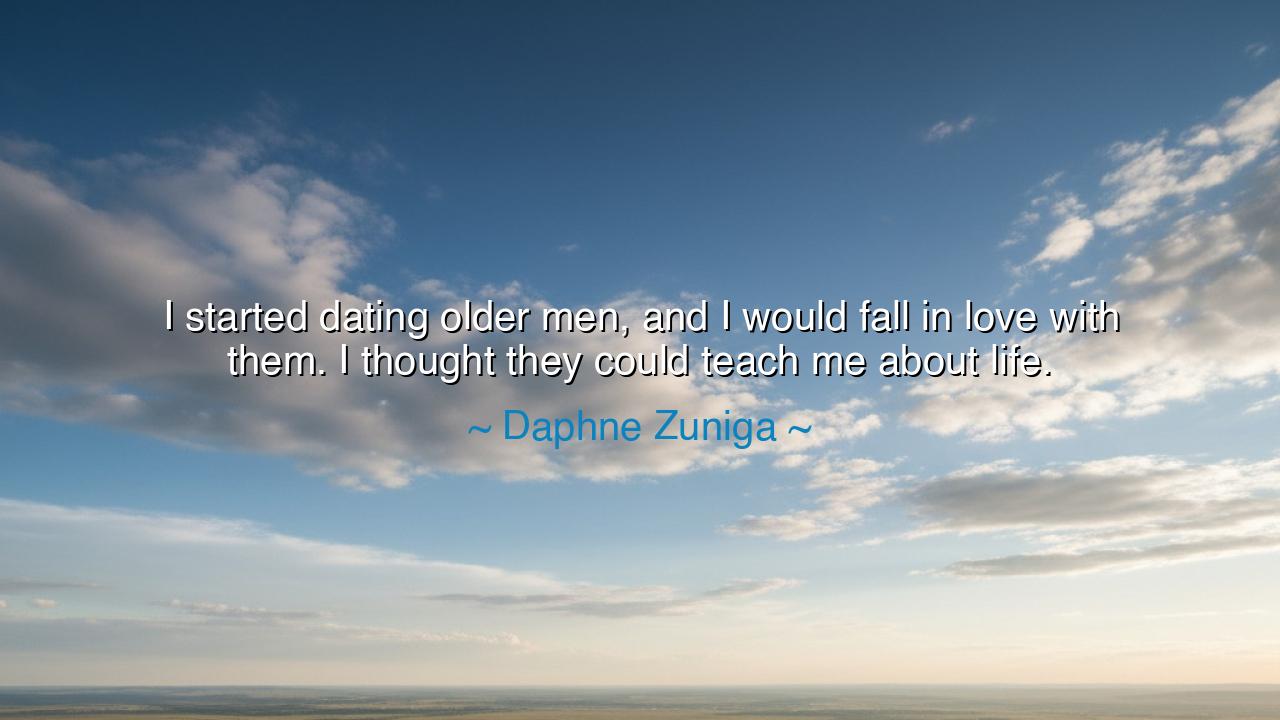
I started dating older men, and I would fall in love with them. I
I started dating older men, and I would fall in love with them. I thought they could teach me about life.






In the words of Daphne Zuniga, spoken with candor and quiet vulnerability, we hear a confession that is both deeply human and timeless: “I started dating older men, and I would fall in love with them. I thought they could teach me about life.” Behind these words lies not mere sentiment, but the eternal yearning of the soul to find wisdom through connection — to learn, not from books or solitude, but from the lived experience of another. It is a yearning that belongs especially to the young and tender-hearted, those who seek not only affection but understanding, not only romance but revelation.
To fall in love, as she describes, was not simply to be enchanted by another’s presence, but to believe that love itself could be a teacher. The older men she speaks of symbolize something larger than age — they represent the allure of certainty, the promise of guidance, the steady flame that seems to know its way through the darkness. Many in youth have sought this — the wisdom of those who have walked before, the calm of those who seem unmoved by chaos. Yet, in her reflection, there is a hidden melancholy — for she speaks not of what she gained, but of what she thought she would find. It is the eternal paradox of innocence: believing that another can hand us the wisdom that only life itself can teach.
The ancients understood this yearning well. In the dialogues of Plato, the philosopher Socrates describes love as the soul’s desire to ascend toward knowledge and truth. In his tale of Diotima’s Ladder, he says that one who truly loves begins by admiring beauty in a single person, but through that love, begins to seek a higher form — wisdom itself. Thus, Daphne’s words echo an ancient pattern: she sought the divine in the mortal, the eternal through the temporary. But as every sage learns, the greatest lessons are not given by others, but discovered through one’s own awakening. The teacher we long for is often hidden within ourselves.
There is also, within her reflection, the story of the seeker and the illusion. The young often believe that those older possess the answers to all of life’s mysteries. But wisdom is not guaranteed by age — it is earned through reflection. Many who seem confident carry their own quiet uncertainties, and even the teacher may still be a student of the same truths. The lesson here is not to scorn the desire to learn from others, but to recognize that no love, however profound, can substitute for the inner journey. As the poet Rumi once wrote, “The teacher you seek is your own soul.”
Yet, there is something noble in the heart that seeks meaning through love. To be willing to learn through intimacy, to trust that closeness can transform — this is not weakness but courage. For love, when true, does teach: it reveals patience, humility, longing, and loss. Perhaps the older men in Zuniga’s life did not teach her in the way she hoped, but they awakened her to the truth that wisdom is not given, it is grown. The heart breaks, the illusions fall away, and what remains is the understanding that life’s lessons cannot be borrowed — they must be lived.
Consider the story of Cleopatra, who, though a queen, sought alliance and affection in the arms of powerful men like Julius Caesar and Mark Antony. To some, she seemed to seek power; to others, she sought knowledge — the companionship of men who had shaped empires. And yet, though she learned from them, her true mastery came not from her lovers, but from her own cunning, intellect, and will. Like Zuniga, she may have looked to others for wisdom, but she became her own teacher. Her life reminds us that love can open doors to understanding, but it is self-awareness that ultimately makes us wise.
The lesson, then, is both tender and resolute: seek wisdom through love, but do not mistake love for wisdom. Let others inspire you, guide you, challenge you — but do not surrender the task of understanding yourself. The heart that leans too heavily on others for meaning forgets its own strength. In practice, this means embracing relationships not as rescues, but as mirrors — reflections of what we must learn within. Ask not, “What can this person teach me about life?” but rather, “What is life trying to teach me through this person?”
So, my listener, take heed of the quiet truth within Daphne Zuniga’s words. To seek wisdom through love is noble, but to awaken wisdom through experience is divine. Love the wise, learn from the kind, and cherish those who walk before you — but never forget that your own path, with all its mistakes and revelations, is the truest teacher of all. For the heart that dares to live, to lose, to rise again — that heart becomes its own philosopher, its own guide, its own source of light.






AAdministratorAdministrator
Welcome, honored guests. Please leave a comment, we will respond soon